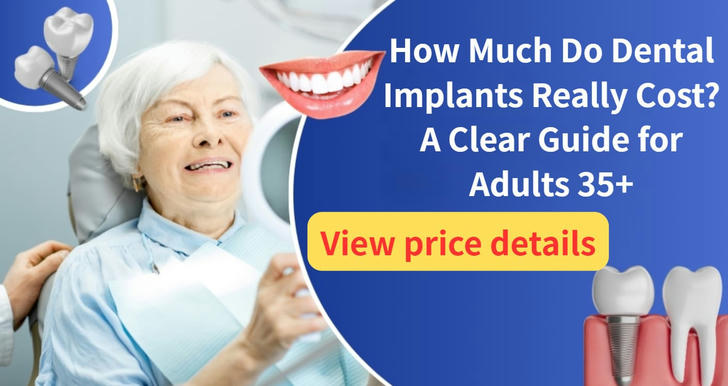How Much Do Dental Implants Really Cost? A Clear Guide for Adults 35+
Dental implant costs/Dental subsidies/Dental implant guide
In the U.S., dental implants are considered one of the most durable and effective solutions for missing teeth, outperforming dentures and bridges. However, cost remains a major concern. This article explains what affects the price—such as age and treatment complexity—and explores available financial assistance options.

1. What’s the Average Cost of a Dental Implant in the U.S.?
According to national guidelines, the total cost of a single dental implant typically ranges from $3,000 to $4,500. This estimate includes:
- Implant fixture (post): $1,000 – $2,000
- Abutment (connector): $300 – $500
- Crown (visible top tooth): $1,000 – $2,000
Note: Additional procedures such as tooth extraction, bone grafting, or CT scans are not included in this range.
2. Key Factors That Affect Dental Implant Costs
- 📍 Location: Costs in large metro areas like New York or San Francisco are typically higher.
- 🧑⚕️ Dentist expertise: Experienced or board-certified specialists may charge more.
- 🦴 Oral condition: Bone loss may require grafts or sinus lifts.
- 🏷 Type of implant system: Premium brands often have higher price tags.
- 🧠 Technology used: Digital scans and guided surgery increase precision but add to the cost.
3. Cost Estimates by Age Group
Although age is not a direct factor in pricing, it often affects bone quality, healing speed, and treatment complexity.
| Age Group | Common Characteristics | Estimated Cost per Implant |
|---|---|---|
| 30–44 years | Healthy bone, fast recovery, usually straightforward treatment. | $3,000 – $4,500 |
| 45–59 years | Mild bone loss or gum issues may require additional prep. | $3,500 – $5,500 |
| 60–74 years | Bone resorption likely, may need sinus lifts or grafts. | $4,500 – $6,500 |
| 75+ years | Often full-mouth cases or bone limitations; may use All-on-4 or mini implants. | $1,000–$2,500 (mini implants) $15,000–$30,000 (All-on-4 per arch) |
💡 Older adults are encouraged to get a full medical and dental evaluation before surgery.
4. Full Mouth Implants (All-on-4)
A popular solution for edentulous patients, All-on-4 involves four implants supporting a full arch of fixed teeth.
- One arch (upper or lower): $15,000 – $30,000
- Both arches (full mouth): $30,000 – $60,000
This method reduces the number of implants needed and typically shortens treatment time.
5. Tips to Reduce Implant Costs
- ✅ Compare clinics to find the most reasonable offer.
- ✅ Look into financing plans like CareCredit or in-house payment options.
- ✅ Explore dental schools for supervised low-cost treatment.
- ✅ Evaluate less invasive alternatives such as mini implants or All-on-4.
6. Assistance Programs for Eligible Applicants
Several national programs offer financial support for dental implant procedures:
✅ Dental Lifeline Network – DDS / WYSOV
- Eligibility:
- 65 or older
- Permanent disability
- Need for medically necessary care
- No dental insurance or ability to pay
- WYSOV is available for qualified veterans
- One-time-only access through a network of over 15,000 volunteer dentists and 3,400 labs
- Suggestion: Apply early as more volunteer slots have recently become available.
✅ Cosmetic Dentistry Grants (CDG)
- Covers both implants and aesthetic procedures
- Grant structure:
- 25% off the first $500–$25,000 of treatment
- 30% off the portion above $25,000
- How to apply:
- Submit online application
- Complete an initial dental exam
- Approved grants are deducted directly from your treatment quote
- Some clinics offer extra grants for All-on-4 and All-on-6 procedures
7. Long-Term Value of Dental Implants
- 🦷 Can last 10 to 25 years with proper maintenance
- 🧱 Help preserve jawbone and facial structure
- 🍽 Restore natural chewing function
- 😁 Boost appearance and social confidence
- 🔧 Low maintenance and do not affect adjacent teeth
Millions of Americans have benefited from dental implants, and adoption continues to grow year after year.
8. Final Thoughts
Dental implants are one of the most effective and reliable options for restoring lost teeth. Although the cost is considerable, the long-term benefits in terms of functionality, health, and quality of life are well worth it for many.
If you're over 35 and considering implants, take the time to compare your options, understand the financial tools available, and look into eligibility-based assistance programs.
